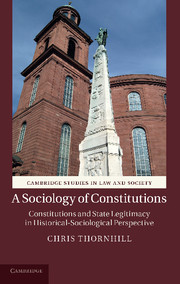 A Sociology of Constitutions
A Sociology of Constitutions Book contents
- Frontmatter
- Contents
- Acknowledgements
- A note on texts and translations
- Introduction
- 1 Medieval constitutions
- 2 Constitutions and early modernity
- 3 States, rights and the revolutionary form of power
- 4 Constitutions from empire to fascism
- 5 Constitutions and democratic transitions
- Conclusion
- Bibliography
- Index
Conclusion
Published online by Cambridge University Press: 07 September 2011
- Frontmatter
- Contents
- Acknowledgements
- A note on texts and translations
- Introduction
- 1 Medieval constitutions
- 2 Constitutions and early modernity
- 3 States, rights and the revolutionary form of power
- 4 Constitutions from empire to fascism
- 5 Constitutions and democratic transitions
- Conclusion
- Bibliography
- Index
Summary
The first conclusion of this book has a functional focus. It claims that constitutions, although often observed as normative arrangements which are deduced and imposed from outside the socio-political structures and institutions of society, are in fact functional articulations of inner-societal processes. In the first instance, constitutions developed as institutions that made it possible for societies, at different stages in their formation, to abstract resources of distinctively political power, to preserve the differentiation of their power from other functions, and to utilize this power, in measured inclusivity, in the context of a differentiated, functionally pluralistic and increasingly positivized societal environment. Constitutions normally play a vital role in enabling societies to construct and address some of their exchanges as distinctively relevant for and included in power: as political. Moreover, constitutions bring the crucial benefit to societies that they allow political systems in modern societies positively to produce power and internally to multiply the reserves of power that they contain. Constitutions have the indispensable inner-societal function that they allow political actors to extract a supportive internal definition of their power, which means that political actors can refer to stable and withdrawn self-constructions in order positively to reproduce, procedurally to apply, and internally to maximize their power in a number of different spatial and temporal settings. On these grounds, this book concludes that constitutions are functional preconditions for the positive abstraction of political power and, as such, they are also, over longer periods of time, highly probable preconditions of institutions using power: that is, states. It is argued throughout this book that modern societies are defined by the fact that they have successfully developed institutions that are able to construct and gradually to augment stores of power that are in some way and to some (always precarious) degree public (that is, internally reproducible, collectively positivized and autonomously abstracted against singular persons): this fact gives a distinctively inclusive and pluralistic form to modern societies.
- Type
- Chapter
- Information
- A Sociology of ConstitutionsConstitutions and State Legitimacy in Historical-Sociological Perspective, pp. 372 - 376Publisher: Cambridge University PressPrint publication year: 2011


